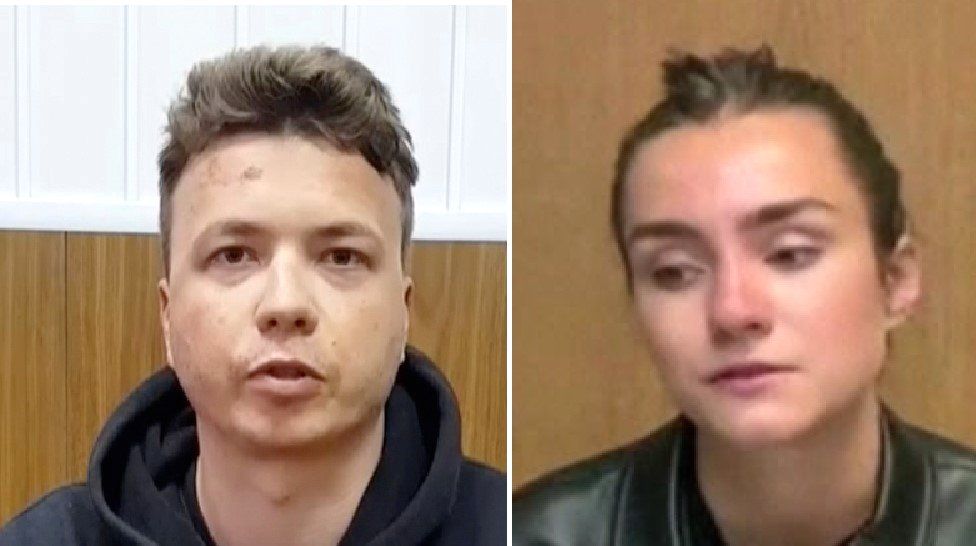Roman Protasevich: House arrest for man seized in Ryanair Belarus jet drama
- Published

A Belarusian dissident who was taken off a Ryanair jet forced to land in Minsk has been transferred to house arrest, authorities have confirmed.
Roman Protasevich was taken into custody on suspicion of inciting unrest after his dramatic capture on 23 May.
His girlfriend, Russian citizen Sofia Sapega, was arrested with him and has also been moved to house arrest, Belarus's investigative committee said.
The EU responded to the plane incident with sanctions on Belarus.
Since their capture during a flight from Greece to Lithuania, both EU states, Mr Protasevich and Ms Sapega have been paraded on Belarusian TV and shown confessing to criminal activity in recordings which appeared to have been made under duress.
Western countries accuse Belarus of hijacking the Ryanair plane under the pretext of a false bomb threat.
The journalist, 26, faces charges that include organising mass unrest and for which he could be sentenced to up to 15 years in prison, while Ms Sapega, 23, is also accused of causing unrest.
"The European Union, along with our like-minded partners, continues to demand their immediate, unconditional release," EU spokesperson Nabila Massrali said on Friday. "They must also be able to travel to the original destination of the journey they took on board of the flight between Athens and Vilnius."
Belarus has been ruled by the same hardline president, Alexander Lukashenko, since 1994. He defied months of protests last year as opposition politicians and activists were arrested and held in prison.
Where have the pair been moved?
News of the transfer was revealed to BBC Russian Service by relatives of both detainees and later confirmed by the investigative committee. The committee said the pair were "consistently confessing" their guilt, and it had granted their request to be released into house arrest.
BBC Russian says they are now living in separate flats. Both had been held on remand since their arrest.
Ms Sapega's parents told the BBC they had met her in a restaurant in Minsk on Thursday, and she was now living in a rented flat in the city. "We're in shock," said her stepfather Sergei Dudich.
House arrest is usually seen as an alternative to jail when the detainee is not considered to be a flight risk.
"Of course we're pleased that she is not in a remand prison, the conditions are quite different," he said, describing her mood as positive.
Mr Protasevich's father, who lives with his wife in Poland, said he had not been contacted by the Belarusian authorities and did not plan to return. "They tell us nothing about how Roma [Roman] is or about his status, it's just outrageous," he said.
"If the form of detention has changed it's an improvement in their living conditions," he added. "Otherwise we don't know what's coming next."
Better conditions but at what price?
Analysis by Olga Ivshina, BBC Russian
Leaving a notoriously harsh KGB prison for house arrest will bring at least physical relief to Roman Protasevich and Sofia Sapega.
But that does not mean they have any significant freedom. We have no idea what price they may have paid for their improved detention conditions.
A day before the move they were both spotted being filmed by a TV crew in a Minsk park. Opposition activists condemned it as a propaganda shoot, and we don't know when it will be broadcast.
Roman Protasevich has already appeared three times on camera: on one occasion, with cuts from handcuffs visible on his wrists, he burst into tears.
The Sapega family lawyer said the change had come about only because of a Putin-Lukashenko summit earlier this month and the efforts of the Russian Embassy.
But the opposition believes Minsk buckled under pressure from the EU: that faced with the threat of painful economic sanctions, Belarus decided to ease their conditions, at least in appearance.
The latest EU sanctions targeted 78 individuals, including some linked to the "forced and unlawful landing" of the Ryanair plane. Further measures focused on key exports including tobacco, petroleum and potash fertiliser.
Dmitry Protasevich said he had found it difficult to comment on the actions of the authorities. "Maybe he's been drawn into some political game," he suggested.
Exiled opposition leader Svetlana Tikhanovskaya welcomed the change but said they were still hostages: "[It] does not mean freedom, they are still facing charges. Their every step is being watched by wardens."
Svetlana Tikhanovskaya: My husband's spirit is not broken
She noted that more than 500 "recognised political prisoners" were still in prison and thousands more faced "made-up and politically motivated charges".
Her own husband Sergei went on trial in Belarus on Thursday accused of disorder and inciting hatred against officials.
Belarus: The basics
- Where is Belarus? It has its ally Russia to the east and Ukraine to the south. To the north and west lie EU and Nato members Latvia, Lithuania and Poland.
- Why does it matter? Like Ukraine, this nation of 9.5 million is caught in rivalry between the West and Russia. President Lukashenko has been nicknamed "Europe's last dictator" - he has been in power for 27 years.
- What's going on there? There is a huge opposition movement demanding new, democratic leadership and economic reform. The opposition and Western governments say Mr Lukashenko rigged the 9 August election. Officially he won by a landslide. A huge police crackdown has curbed street protests and sent opposition leaders to prison or into exile.
Related Topics
- Published25 May 2021
- Published24 May 2021
- Published9 June 2021